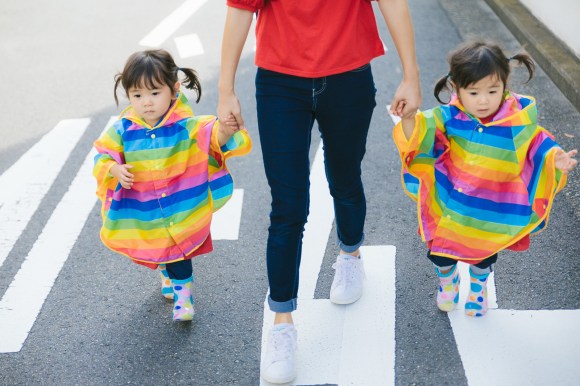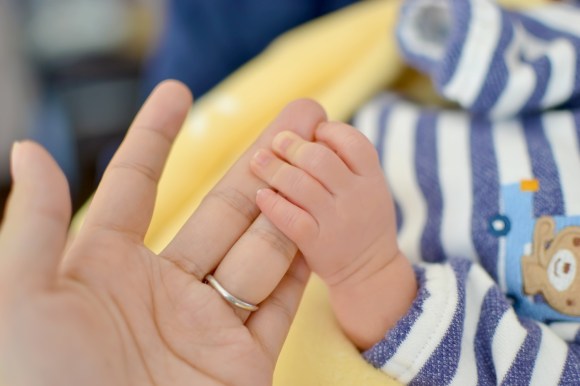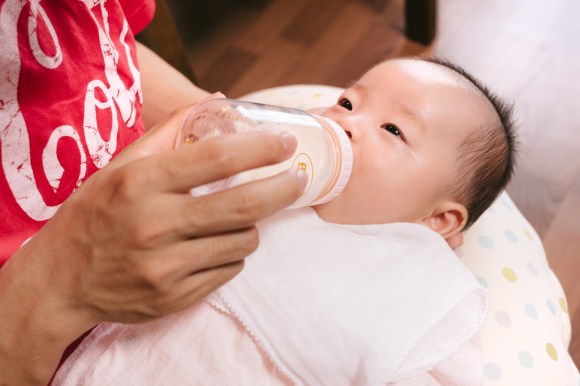
In Japan, working mothers are often frowned upon, but is it the same in China?
It’s hard to be a working mother anywhere in the world, but in Japan it often seems like there are extra hurdles to overcome. Japanese women face enormous pressure to quit their careers in favor or motherhood, and because they often have to leave work early or take days off for their children, working women are considered a burden on the company, and are not always warmly welcomed back after giving birth. What’s more, a daycare shortage in Japan means women (who are the primary child caretakers in most marriages) feel forced to leave their jobs, unless they’re lucky enough to be able to bring their baby to work, an arrangement most employers aren’t willing to accommodate.
Our Japanese-language correspondent Meg was talking about these issues with a Chinese friend, Mrs. A, who told Meg that Chinese working mothers don’t face the same stigma as their Japanese counterparts. Mrs. A is an ambitious woman who worked hard as a student to earn various qualifications in preparation for her career, even working in Japan for a time, and has changed her occupation multiple times in order to climb the business ladder. But she is also a mother of one, so she volunteered to tell us about her experience as a working mother in China.
What does Mrs. A say is the societal perception of employed moms in China? Apparently they are more desirable candidates than even fresh college graduates, because:
“Before giving birth, most women usually have lots of work experience, right? That’s one reason. Plus, more than anything else, they are viewed as more responsible, because they have children. There is no reason for them to be disliked by their employers.”
A pretty sensible explanation. In most cases, women take up jobs after graduating from university, so it’s not like mothers are inexperienced applicants. They should, in a sense be more qualified than college applicants.
Mrs. A continued on to explain that elements of Chinese culture play a role in its citizens’ perceptions as well.
“We used to have the one-child policy in China, and even today, most people want to focus all of their parenting on one child. Few choose to have more. From a company’s point of view, once they’ve already had their child, there likely won’t be much change in the mother’s life, so they’re considered stable employees.
Of course, people quit and change jobs all of the time, but if you’re a company, you want to keep the best workers, don’t you? They’d prefer employees who are responsible and are almost guaranteed to have stability in their lives. In China, just because you have a child, it doesn’t mean you’re at a disadvantage. Rather it makes you more appealing than even new college graduates!”
In short, in China, working mothers are perceived in a more positive light, not as “unreliable because they have children”, but rather as “more responsible because they have children”. However, there’s a key cultural difference that may make a significant impact on how working mothers are perceived, and that’s the tendency for families to have only one child. While Japan’s birthrate has been steadily decreasing for various reasons, there has never been a government-mandated one-child policy, and there’s no expectation that families will only have one child.
But really, shouldn’t a mother be considered stable either way, especially if she has multiple children? Let’s be honest, she’ll probably need the extra income to pay for everything those children need, like expensive school uniforms.
In any case, in Japan, even if you are able to work, it can be hard to find affordable childcare that will allow you to work. Meg wondered who cares for Chinese children while their parents are working, so she asked Mrs. A. In her case, she leaves her child in the care of her parents. From a Japanese perspective it might be considered a burden to rely on the grandparents so heavily for childcare, but this seems to be normal in Communist China, where all members of society are apparently expected to work, including mothers, and where the raising of children falls to the non-working grandparents.
Furthermore, in Japan there is the belief that “children need to be with the mothers until age three”, but in China, there is no stigma against leaving your children with someone else, as it’s a common practice. Working mothers are not considered bad mothers simply for not spending every hour of every day with their children.
Of course, this is only Mrs. A’s experience, and different people could have different responses depending on the company, the region, and the family. But when Meg asked her other Chinese acquaintances, she got similar responses from all of them, indicating that Mrs. A’s perceptions may just be the norm in China.
That’s not to say that Chinese motherhood is all roses and Japanese motherhood all thorns. Mrs. A made sure to point out the good things about having children in Japan as well.
“Japan has a lot of good points too. For example, you can take a whole year off for maternity leave, right? I’ve heard that you can even extend it. But you can’t take that long in China. I only got about five months for my child’s birth.
It’s also different in terms of schooling. In China, there are two different family registers: a city register and a rural register. Even if you live in the city, if your family is registered in the countryside, your child will not be admitted into a school in the city. You have to go through a complex process to enroll them. In Japan, you can just send your kids to whatever district is written on your residence card, right? I’m jealous.”
This discussion brings up a valuable point: can one country really be considered better than another, especially in regard to women’s rights and gender gaps? After all, there are a lot of good reasons to be a woman in Japan, and Japanese women don’t necessarily always feel at a disadvantage, particularly when men are expected to work extremely hard to support their families. Some major companies in Japan are even making an effort to make life easier for working mothers. Nevertheless, it’s beneficial to have these kinds of conversations with people from other cultures, to find out what kinds of things make up the good, and the bad, of our own societies.
Top image: Pakutaso
Insert images: Pakutaso (1, 2, 3)
[ Read in Japanese ]




 5 powerful reasons to be a woman in Japan 【Women in Japan Series】
5 powerful reasons to be a woman in Japan 【Women in Japan Series】 Try not to cry at this series of short films showing struggles working mothers face in Japan
Try not to cry at this series of short films showing struggles working mothers face in Japan Japanese Americans tell STORIES FROM TOHOKU
Japanese Americans tell STORIES FROM TOHOKU Emotional video explores the gap between ideals and reality for working mothers in Japan【Video】
Emotional video explores the gap between ideals and reality for working mothers in Japan【Video】 Have you ever wondered what kind of smartphone Shaolin monks want?
Have you ever wondered what kind of smartphone Shaolin monks want? McDonald’s new Happy Meals offer up cute and practical Sanrio lifestyle goods
McDonald’s new Happy Meals offer up cute and practical Sanrio lifestyle goods All-you-can-drink Starbucks and amazing views part of Tokyo’s new 170 meter-high sky lounge
All-you-can-drink Starbucks and amazing views part of Tokyo’s new 170 meter-high sky lounge Studio Ghibli releases new action figures featuring Nausicaä of the Valley of the Wind characters
Studio Ghibli releases new action figures featuring Nausicaä of the Valley of the Wind characters Starbucks reopens at Shibuya Scramble Crossing with new look and design concept
Starbucks reopens at Shibuya Scramble Crossing with new look and design concept Super Nintendo World expansion gets delayed for several months at Universal Studios Japan
Super Nintendo World expansion gets delayed for several months at Universal Studios Japan Studio Ghibli glasses cases let anime characters keep an eye on your spectacles
Studio Ghibli glasses cases let anime characters keep an eye on your spectacles 11 different ways to say “father” in Japanese
11 different ways to say “father” in Japanese The madness ends now: How to conqueror impossible-to-open Japanese convenience store snacks
The madness ends now: How to conqueror impossible-to-open Japanese convenience store snacks Gacha machine backpack is Japan’s hottest new fashion statement
Gacha machine backpack is Japan’s hottest new fashion statement Is it OK to bite through your ramen noodles while slurping them in Japan? Internet debates
Is it OK to bite through your ramen noodles while slurping them in Japan? Internet debates More foreign tourists than ever before in history visited Japan last month
More foreign tourists than ever before in history visited Japan last month Disney princesses get official manga makeovers for Manga Princess Cafe opening in Tokyo
Disney princesses get official manga makeovers for Manga Princess Cafe opening in Tokyo Beautiful new Final Fantasy T-shirt collection on the way from Uniqlo【Photos】
Beautiful new Final Fantasy T-shirt collection on the way from Uniqlo【Photos】 Is the new Shinkansen Train Desk ticket worth it?
Is the new Shinkansen Train Desk ticket worth it? Foreign English teachers in Japan pick their favorite Japanese-language phrases【Survey】
Foreign English teachers in Japan pick their favorite Japanese-language phrases【Survey】 Beautiful Sailor Moon manhole cover coasters being given out for free by Tokyo tourist center
Beautiful Sailor Moon manhole cover coasters being given out for free by Tokyo tourist center Studio Ghibli releases Kiki’s Delivery Service chocolate cake pouches in Japan
Studio Ghibli releases Kiki’s Delivery Service chocolate cake pouches in Japan Japan’s bone-breaking and record-breaking roller coaster is permanently shutting down
Japan’s bone-breaking and record-breaking roller coaster is permanently shutting down New definition of “Japanese whiskey” goes into effect to prevent fakes from fooling overseas buyers
New definition of “Japanese whiskey” goes into effect to prevent fakes from fooling overseas buyers Our Japanese reporter visits Costco in the U.S., finds super American and very Japanese things
Our Japanese reporter visits Costco in the U.S., finds super American and very Japanese things Studio Ghibli unveils Mother’s Day gift set that captures the love in My Neighbour Totoro
Studio Ghibli unveils Mother’s Day gift set that captures the love in My Neighbour Totoro Domino’s Japan now sells…pizza ears?
Domino’s Japan now sells…pizza ears? New Japanese KitKat flavour stars Sanrio characters, including Hello Kitty
New Japanese KitKat flavour stars Sanrio characters, including Hello Kitty One of Tokyo’s most famous meeting-spot landmarks is closing for good
One of Tokyo’s most famous meeting-spot landmarks is closing for good Kyoto creates new for-tourist buses to address overtourism with higher prices, faster rides
Kyoto creates new for-tourist buses to address overtourism with higher prices, faster rides Sales of Japan’s most convenient train ticket/shopping payment cards suspended indefinitely
Sales of Japan’s most convenient train ticket/shopping payment cards suspended indefinitely Sold-out Studio Ghibli desktop humidifiers are back so Totoro can help you through the dry season
Sold-out Studio Ghibli desktop humidifiers are back so Totoro can help you through the dry season Japanese government to make first change to romanization spelling rules since the 1950s
Japanese government to make first change to romanization spelling rules since the 1950s Ghibli founders Toshio Suzuki and Hayao Miyazaki contribute to Japanese whisky Totoro label design
Ghibli founders Toshio Suzuki and Hayao Miyazaki contribute to Japanese whisky Totoro label design Doraemon found buried at sea as scene from 1993 anime becomes real life【Photos】
Doraemon found buried at sea as scene from 1993 anime becomes real life【Photos】 Tokyo’s most famous Starbucks is closed
Tokyo’s most famous Starbucks is closed One Piece characters’ nationalities revealed, but fans have mixed opinions
One Piece characters’ nationalities revealed, but fans have mixed opinions We asked a Uniqlo employee what four things we should buy and their suggestions didn’t disappoint
We asked a Uniqlo employee what four things we should buy and their suggestions didn’t disappoint Princesses, fruits, and blacksmiths: Study reveals the 30 most unusual family names in Japan
Princesses, fruits, and blacksmiths: Study reveals the 30 most unusual family names in Japan The top 10 traits of the “perfect wife” according to the ladies of one Chinese city
The top 10 traits of the “perfect wife” according to the ladies of one Chinese city Mother smacks child for riding bike in front of oncoming car, debate ensues【Video】
Mother smacks child for riding bike in front of oncoming car, debate ensues【Video】 Japanese teacher simply asks to be treated like a human being
Japanese teacher simply asks to be treated like a human being Japanese advice columnist shuts down mother who doesn’t want to give son permission to marry
Japanese advice columnist shuts down mother who doesn’t want to give son permission to marry 6 surprising things about having a baby in Japan
6 surprising things about having a baby in Japan “If I don’t download free music, I’ll get bullied!” – IT worker’s experience with net-using kids
“If I don’t download free music, I’ll get bullied!” – IT worker’s experience with net-using kids Japan’s revised child care law makes it easier for fathers to take four weeks of paternity leave
Japan’s revised child care law makes it easier for fathers to take four weeks of paternity leave Japanese newlyweds can order a special wedding service that won’t leave a dry eye in the house
Japanese newlyweds can order a special wedding service that won’t leave a dry eye in the house Short documentary explores the significance of Japanese children being independent from a young age 【Video】
Short documentary explores the significance of Japanese children being independent from a young age 【Video】 Over half of Japanese people in survey only dated three or fewer people before getting married
Over half of Japanese people in survey only dated three or fewer people before getting married Anime pregnancy cosplay turns baby bump into Baki bump【Photos】
Anime pregnancy cosplay turns baby bump into Baki bump【Photos】 Blink and you’ll miss what riled racists in this Japanese McDonald’s ad 【Video】
Blink and you’ll miss what riled racists in this Japanese McDonald’s ad 【Video】 What’s the best way to close the gender gap in Japan? Japanese women weigh in
What’s the best way to close the gender gap in Japan? Japanese women weigh in Shanghai Disneyland to feature Chinese elements and the largest castle ever, opens spring 2016
Shanghai Disneyland to feature Chinese elements and the largest castle ever, opens spring 2016
Leave a Reply